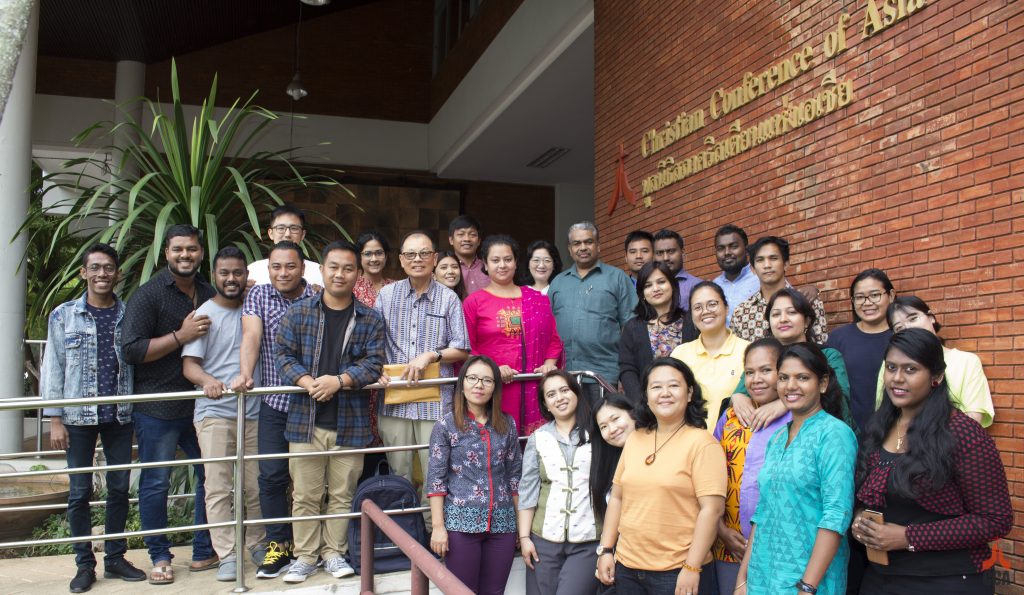Asian Ecumenical Institute of CCA to train prospective Church and ecumenical leaders
 Participants of AEI-2019
Participants of AEI-2019
Twenty-seven young ecumenists from across Asia are currently attending the month-long Asian Ecumenical Institute (AEI) organized by the Christian Conference of Asia. The AEI aims at providing ecumenical formation and leadership development training for prospective church and ecumenical leaders and is being held at the CCA headquarters in Payap University Campus in Chiang Mai, Thailand.
Focusing on the theme ‘Ecumenical Pilgrimage of Struggle for Peace with Justice in Asia’, this year’s Asian Ecumenical Institute commenced on 1 July 2019.
Dr. Mathews George Chunakara, General Secretary of the CCA stated, “The real value of the AEI would materialize and be recognized only after a few years. At least some participants of each year’s AEI training will eventually emerge as church or ecumenical leaders in their respective churches and in the region”.
“The month-long intensive training course and opportunities for interactions and dialogue while living together with their peer groups from multi ethnic and cultural Asian contexts will enrich and enable each participant to be more proactive and nurture ecumenism in their respective local context”, added the CCA General Secretary.
Romella Robinson, an ordained woman minister from the Presbyterian Church of Pakistan, shared her hopes and expectations from the AEI and stated “Ecumenism is not well known and is unheard by many in my local context. I am here to learn from the participants belonging to different church traditions in Asia and to develop strategies for nurturing much-needed grassroots-level ecumenism in Pakistan. I am fascinated to be part of this training”.
Frans Pangrante, an indigenous youth from Indonesia’s Toraja Church, shared that he had learnt the theories of ecumenism while doing his theological studies, and was now at the AEI to experience ecumenism in action.
“The AEI will be a great opportunity for mutual learning, discussions and developing collaboration with other participants of AEI”, said Pangrante.
This year’s outdoor study sessions include visits to the village of Mae-ai on the Thailand-Myanmar border, interactions with refugees and stateless people, visits to the stateless children’s school in Chiang Rai, and meeting with Buddhist monks for dialogue on faith in the context of religious plurality.
The faculty for AEI consists of internationally acclaimed ecumenists, theologians, academics, social activists as well as CCA programme executives.
Prominent members of the faculty of AEI include Dr. Wesley S. Ariarajah (Emeritus professor at Drew University in the USA), Dr. Eh Tar Gay (Vice-President of the Myanmar Institute of Theology), Rev. Dr. R.C. Thomas (Professor of Systematic Theology in India), Rev. Dr. Binsar Pakpahan (Professor at Jakarta Theological Seminary), Rev. Dr. Pradit Takerngrangsarit (formerly President of the Payap University and the Dean of the McGillivray College of Divinity in Chiang Mai), Dr. Le Ngoc Bich Ly (from the Institute of Religion and Culture in Thailand, Vietnam), Venerable Dr. Phramaha Boonchuay Doojai (Mahachulalongkornrajavidyalaya University, Thailand), and Mr. Jelvas Musau (United Nations High Commissioner for Refugees), Dr. Mathews George Chunakara, General Secretary of the CCA and CCA staff members Dr. Chuleepran Srisoontorn, Rev. Jung Eun Moon, Dr. Reynaldo Racaza Ty, Rev. Dr. Ngur Liana, Dr. Ronald Lalthanmawia, and Ms. Rosiana Purnomo.
The Asian Ecumenical Institute will conclude its sessions on 30 July, 2019.










